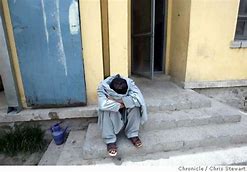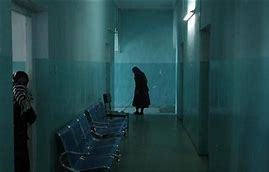Not infrequently I write poems that I think I can describe only as ‘bleak and brutal’. I could argue that they are necessary, and that poets should indeed be engaging with all aspects of humanity and nature, however awful and yet I also find it troubling. Nevertheless, I feel compelled to continue.
In my defence, I will quote Emlyn Williams in his foreword to Beyond Belief, his book about the ‘Moors Murderers’, Ian Brady and Myra Hindley: “When a shocking scandal blows up, with all the attendant sensationalism, there is in some people an instinct to avert the head and shovel the whole thing under the carpet, ‘I don’t want to know.’ But some of us do want to know, and it is salutary to inquire: the proper study of mankind is Man. And Man cannot be ignored because he has become vile. Woman neither.”
The following poem was written following my watching of a BBC News documentary by an Afghan journalist. I cry just recalling it, and I do not know right now whether I will be able to read it out in public. Just reading it over to myself silently makes me cry. The Afghans have suffered nearly forty years of war currently. Although inspired by this country’s awful tragedy, the poem was attempting to be universal. War is traumatic anywhere. What will be the psychological fall-out from the current war in Syria? What was the fall-out of the civil war in Rwanda? On and on and on it goes…
https://www.bbc.co.uk/iplayer/episode/b09s741m/our-world-the-trauma-of-war
The poem was published on Poetry 24 on 20/02/2018: http://www.poetry24.co.uk/2018/02/voices-inside-madhouse.html?spref=fb
Voices inside the madhouse 
They send people here who have no future.
Heroin addiction. Depression. PTSD.
Some patients are picked up from the streets.
Others are brought here by their families.
Many have no families. They fled the country.
This is a place for people who are a threat to society.
They need love and attention on a daily basis.
You can find yourself inside these walls.
Outside the walls you can’t find yourself.
I dreamt you took me away from here.
The volunteer counsellor suffers from PTSD.
His teenage brother was killed in a gun attack.
It was just across the road from his shop.
He is one of the lucky ones. He has a family.
They send people here who have no future.
We used to watch the executions in the stadium.
The stadium was always full. Once a week
we would say, ‘Let’s go down to the stadium.’
People climbed trees for a good view.
It was normal.
They shot a woman in the head for adultery.
Once they brought a thief and chopped off his hand.
They threw it in the air. It kept moving
after it fell. In the dust. Like this.
I can’t get the image out of my head.
Hundreds of executions. I was seventeen or eighteen. 
It was normal. We feel safe here.
I dreamt you took me away from here.
Drug-induced schizophrenia. Depression. PTSD.
They send people here who have no future.
© David Urwin 2018
BBC News Channel 08/02/2018 Inside Afghanistan’s only high-security
mental institution.
12/02/2018 The trauma of war

This poem is terrible and the life you describe here is unbearable! What is PDST? A psychiatric disease? I believe you tried the same feelings I had many years ago when I read the great novel “La storia” (The history) by Elsa Morante about a woman who lives in Rome during 2nd W.War and after loosing husband and children ends up in a psychiatric asilum. How much useless suffering in this world for no reason! “The Moors murderers” were that couple, you once mentioned to me, that many years ago had killed many children in Northern England?
LikeLike
PTSD=Post traumatic stress disorder. Not uncommon among soldiers, but also among people who have witnessed terrorism attacks, civilians under bombardment,etc. Yes, the two murderers killed children in the Manchester area in the early 1960s, when I was growing up there. They are considered the archetype of evil in the UK. Ian Brady died only recently (in captivity), and never revealed where he had buried one ( I think) of their victims.
LikeLike
Of yes, I understand. I know what is post traumatic stress disorder. Those two children murderers had to be terrible psycopatic persons. But anyway there are similar people also in Italy (and all over the world), serial killers and so on. These people are the witches and orgres of children tales. So many misteries in our minds
LikeLike
Deeply moving Dave, thanks for sharing it.
LikeLiked by 1 person
As I said somewhere else, this is a searing work.
LikeLiked by 1 person
Thanks, Paul. I appreciate your comment.
LikeLiked by 1 person
Paul is right. A poet should write about everything, above all the situations that move him. Just about war I want to remember the great italian poet Giuseppe Ungaretti (belonging to the “Ermetismo” school) who partecipated at 1st W.W. and wrote about his feelings at that time. One poem is terrible, about him laying a whole night in a trech face to face with a killed mate. I advice you to read the work of this poet. Certainly there are translations in English as he won a Nobel price
LikeLiked by 1 person